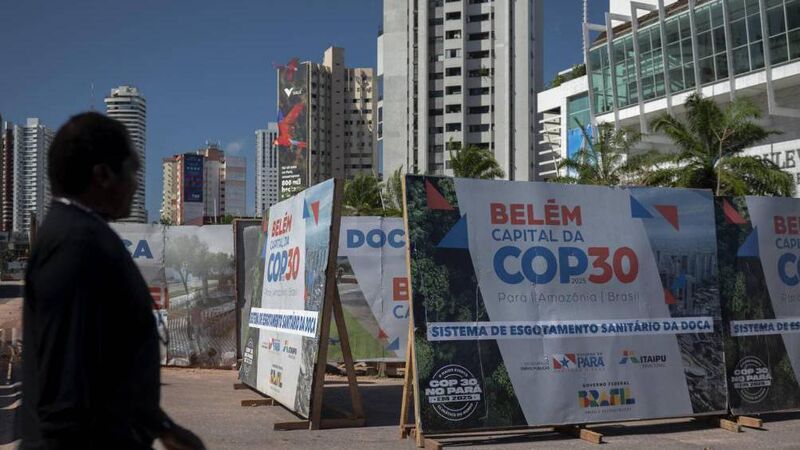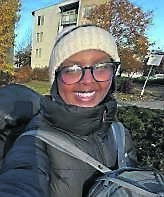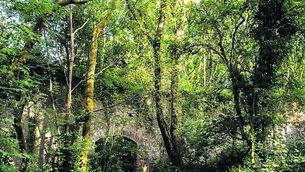Cork Views: Why I’m attending COP30 summit in Brazil

Infrastructure in place for COP30, which takes place in Belém, Brazil, later this month
I first learned about climate change in the most harmless way - a PowerPoint presentation in primary school, complete with a clip-art polar bear floating on a melting ice cap. It was distant and abstract, something that lived in the world of ‘someday’.
But by the time I was in first year of secondary school, that ‘someday’ had arrived. The tone shifted from ‘isn’t this interesting?’ to ‘this is happening now’.
When I began taking action at 12, I didn’t imagine it would one day bring me from Cork classrooms to the global stage. Yet in a few weeks, I’ll travel to Belém, Brazil, as part of University College Cork’s delegation to the United Nations Climate Change Conference - COP30 - representing students, youth, and communities demanding climate justice.
The privilege of being there isn’t lost on me. These conferences are, in many ways, exclusionary: spaces where the loudest voices are often the most powerful, not the most affected.
But I’m determined to bring the latter into the room.
My journey into climate activism began - like it does for many - from a mix of fear, frustration, and heartbreak. At the time, I couldn’t have articulated the colonial and capitalist roots of the crisis. I didn’t know the language of systems or emissions or policy. I just knew it felt the world was burning and nobody cared.
The planet I loved - the one I walked through every day - seemed to be slipping away, one flood, one storm, one drought at a time.
I recall my family in Somalia calling to say it hadn’t rained for months - and then, a few days later, another call: the rains had come, and everything was gone. The crops, animals, soil, the hope. I couldn’t yet name it as climate injustice, but I felt it deeply. That feeling - of watching disaster unfold in two places at once - became the starting point for all that followed.
That year, with a small group of equally restless young people in my school, we organised Cork’s first student climate protest. Over 5,000 showed up. I recall standing on Opera Lane with co-organiser Mira Henchi, looking at each other thinking “What on earth is going on”.
Only on reflection can I truly try to articulate the myriad of emotions I felt that day. Happy our hard work paid off, but scared to see so many young people were skipping their right to education to tell their government how to do their job. It was chaotic and beautiful and slightly terrifying (and what I’d now describe as dystopian), but it changed everything.
It showed us young people could mobilise, we could be heard - even if we had to shout.
We didn’t stop there. We founded SCAN - the Student Climate Action Network - to give young people in Ireland the tools to organise, protest, and demand better climate education in schools. And it just went up from there.
Looking back, I feel incredibly lucky to have come of age during what people now call the Green Wave. It was messy and imperfect, but it was full of energy, solidarity, and something I think we’ve all been searching for since: hope.
Since then, my advocacy has grown. I had the privilege of attending COP27 on behalf of SCAN, as an advisor on the Youth Climate Research Project, and delivering countless workshops in schools, community centres, and boardrooms - helping people make sense of the crisis we face and, more importantly, their place in it. Through it all, one truth has stayed constant: change begins with education.

Education was where I first felt empowered. It’s the reason I became an environmentalist in the first place. When people understand an issue, truly understand it, they begin to care in ways that compel them to act.
As a second-year Law student, Quercus Active Citizenship Scholar, and Environmental & Sustainability Representative for the UCC Students’ Union, I’ve tried to embed that same philosophy in everything I do.
One of the projects closest to my heart has been co-leading the UCCSU Student Food Pantry alongside Cian Walsh - fellow Quercus Scholar and former Environmental Representative.
The Pantry tackles two issues often seen as separate but deeply intertwined: food waste and food insecurity. In collaboration with FoodCloud, every week, surplus food that might have gone to landfill is redistributed to students who need it most, turning what could be waste into something genuinely sustaining.
It’s climate action you can feel - tangible, local, and human.
As I prepare to attend COP30 in the Brazilian Amazon, I’m acutely aware of what’s at stake. Belém - a city in the heart of the rainforest - is both a symbol of the planet’s fragility and its resilience. It’s also where the first global stock-take since the Paris Agreement will take place - when the world is supposed to assess if it’s still on track to limit warming to 1.5C.
Spoiler alert: we’re not. Current policies put us closer to 2.7C of warming, a path the UN has described as “a death sentence” for millions.
At COP30, I’ll be following negotiations under the Just Transition Work Programme - a framework designed to ensure that as we move away from fossil fuels, we don’t leave people behind. Because climate policy isn’t just about cutting carbon; it’s about reimagining economies, protecting livelihoods, and addressing centuries of inequality.
In Ireland, those conversations are just beginning - about how we support farmers and rural communities via agricultural reform, how we retrain workers from high-emission industries, how we build a future that doesn’t just look green on paper, but feels fair in practice.
For many in the Global South, however, the term ‘just transition’ is not a buzzword - it’s survival. It’s the difference between development and displacement.
If I’m honest, I go into COP with cautious optimism. The climate movement has taught me to be hopeful, but not naive. At COP28 in Dubai, there were 2,456 fossil fuel lobbyists - more than the entire delegations of the ten most climate-vulnerable countries combined. It’s hard to talk about progress when those most responsible for the crisis have the biggest seats at the table.
But I go anyway. Because every time I’m in those rooms, I remember the real solutions don’t start there - they start here. In Cork, where students line up every Monday for the Food Pantry. In Kenya, where youth groups plant trees to restore degraded land. In Brazil, where Indigenous communities defend the rainforest with their lives. These are the frontlines of climate action.
COP, at its best, should amplify them - not overshadow them.
When I return from COP30, I’ll share what I’ve learned with students and the wider community. My hope is that people see these global negotiations not as distant politics, but as something that belongs to all of us.
The climate crisis is not an abstract problem to be solved by “leaders” - it’s a lived reality, shaped and resisted by ordinary people.







 App?
App?




